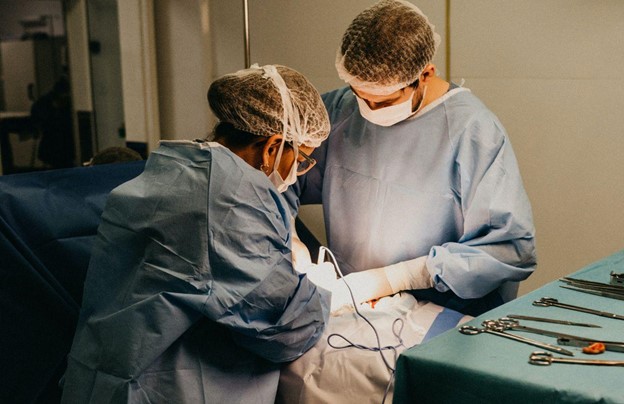
When sinusitis hits, it can create an overwhelming cycle of congestion, headaches, and fatigue. While many sinus issues can be resolved without surgical intervention, there are cases where surgery becomes the optimal choice.
If over-the-counter remedies and home treatments fail to provide relief, sinus surgery may offer a viable solution. There are different types of sinus surgery, and each has its risks and benefits. Before undergoing surgery, it’s important to understand the risks and benefits, weigh all your options, and choose the procedure that’s right for you.
Procedures for Sinus Surgery
1. Maxillary Sinus Procedure: This is a common type of sinus surgery. It’s also called the Caldwell-Luc operation.
The surgeon removes the bone that separates your sinuses from your eyes. This allows the sinuses to drain better.
The surgeon may also place a balloon in your sinus to open it up more. Complications from this procedure are rare but can include infection, bleeding, and numbness around your eyes.
2. Functional endoscopic sinus surgery (FESS): This is a minimally invasive sinus surgery that has overtaken the Cadwell-Luc operation in popularity.
The surgeon inserts a thin, lighted tube (endoscope) into your nose. The endoscope allows the surgeon to see into your sinuses and remove any blockages.
FESS is often used to treat ethmoid sinusitis and frontal sinusitis.
3. Adenoidectomy: This is a sinus surgery that’s often done in children. It involves the removal of the adenoids, which is lymph tissue located at the back of the nose.
Adenoidectomy may be recommended if your child has sinusitis that doesn’t respond to treatment or if they have sleep apnea.
4. Ethmoidectomy: The surgeon removes part of the thin bone that separates your nasal cavity from your brain (the ethmoid sinuses).
This allows the sinuses to drain better. The surgeon may also remove some of the tissue around your ethmoid sinuses.
Complications from this procedure are rare but can include infection, bleeding, and CSF (cerebrospinal fluid) leakage.
5. Frontal Sinusotomy: The surgeon makes a cut into your frontal sinuses (located above your eyes).
The surgeon may also place a balloon in your frontal sinus to open it up more.
Complications from this procedure are rare but can include infection, bleeding, and injury to the eye or surrounding structures.
6. Septoplasty: This is a surgical procedure in which the surgeon straightens the bone and cartilage that divides your nasal cavity in half (the septum).
Complications from this procedure are rare but can include infection, bleeding, and a hole in the septum ( perforation).
7. Sphenoid Sinus Procedure – The surgeon removes part of the bone that separates your sphenoid sinuses from your brain (the sphenoid sinuses are located behind your nose).
Other types of sinus surgery procedures to be mentioned are sinus elevation, sinus implants, sinus grafts, turbinate reduction, septoplasty, balloon sinus dilation, sinus surgery for polyps e.t.c
Risks and Side Effects Associated With Sinus Surgery

As with any surgery, there are always risks and side effects associated with sinus surgery.
As for side effects, you may experience swelling and bruising around your eyes, nose, and cheeks. You may also have numbness around your eyes and a stuffy nose.
Some patients may experience numbness or tingling in the face, a decreased sense of smell, and/or persistent headaches.
The most common risks include:
- Bleeding
- Infection
- Scarring
Sinus surgery, when done wrongly or in some rare cases, can cause serious complications such as:
- Brain damage
- Eye damage
- Nerve damage
- Death
It’s important to note that while sinus surgery can be very effective in treating sinusitis, it’s not a cure-all. In some cases, sinus surgery may need to be repeated.
Again, it’s important to discuss these risks and side effects with your sinus specialist before undergoing any procedure.
How Long It Takes To Recover From Sinus Surgery
The amount of time it takes to recover from sinus surgery will depend on the type of procedure you had.
For example, if you had a sinusotomy (a sinus surgery that involves cutting into your sinuses), you can expect to be back to your normal routine within a week.
However, if you had a more invasive procedure such as an ethmoidectomy (a sinus surgery that involves removing part of the bone that separates your nasal cavity from your brain), it may take up to four weeks to recover.
Cost of Sinus Surgery in Singapore
The cost of sinus surgery in Singapore varies depending on the particular procedure being performed and the individual surgeon’s fees.
Generally speaking, FESS is the most expensive type of sinus surgery, while septoplasty is usually the least expensive.
Ethmoidectomy falls somewhere in between.
Of course, cost should not be the only consideration when deciding whether or not to have sinus surgery. However, it is an important factor that should be taken into account.
Sinus Surgery Success Rates
There are a few different surgical procedures that can be used to treat sinusitis, and the success rate varies depending on the particular procedure.
One of the most common procedures is functional endoscopic sinus surgery (FESS). The success rate for FESS is generally quite high, with most patients reporting significant improvement in their symptoms after surgery.
But it’s important to note that FESS is not a cure-all; some patients may still experience occasional bouts of sinusitis even after successful surgery.
Ethmoidectomy, another sinus procedure, has a success rate of about 85%, while the success rate for septoplasty is closer to 95%.
However, these numbers are only averages.
So while some patients may experience better results, others may not be so lucky. Thus, it’s important to discuss your expectations with your surgeon before undergoing any procedure.
Can Sinusitis Be Cured Without Surgery?
In some cases, sinusitis can be cured without surgery. This is usually the case when the sinusitis is mild and can be treated with medication.

These can be over-the-counter medications prescribed by an ENT specialist, such as antihistamines, antibiotics, or decongestants.
If a case arises where the sinusitis is more severe or chronic, then surgery may be necessary.
Final Thoughts: Weighing All Of Your Options Before Deciding On Surgery
As we mentioned earlier, each patient’s situation is unique. That means that what works for one person may not work for another.
That’s why it’s so important to weigh all of your options before deciding on surgery for sinusitis.
If conservative treatment options like antibiotics and antihistamines haven’t worked for you, then surgery may be your best bet. It should be considered a last resort after other treatment options have failed.
Sinus surgery is a big decision that should not be taken lightly.
But if you’re not sure if you’re ready to undergo surgery, then you can always talk to your doctor about other options.